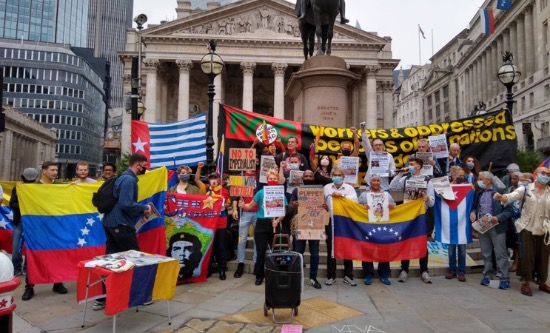
With breath-taking arrogance, the British government has set itself up as the arbiter of who is the rightful head of a sovereign state. In papers submitted to the Supreme Court in London, as a new case began on 19 July over Venezuelan gold held by the Bank of England, the Foreign Secretary Dominic Raab attacked what he called the ‘illegitimate regime’ of Venezuelan President Nicolas Maduro (elected in 2018 with 67% of the vote), claiming that ‘the UK government has the right to decide who to recognise as the legitimate head of a foreign state’.
These colonialist pretensions will determine the fate of $1.8bn of gold frozen in the Bank of England, gold that Maduro has demanded be paid into the country’s Central Bank so it can be used to fund vaccines and medical supplies in the midst of the Covid-19 pandemic. The Foreign Office re-emphasised its intention to hand the gold over instead to the US-backed, self-declared ‘interim president’ Juan Guaido, who has launched a string of failed coup attempts since he burst onto the political scene in 2019. In October 2020, the Court of Appeal annulled a High Court verdict awarding administration of the gold to Guaido and his parallel ‘Bank of Venezuela’ board, none of whom live in Venezuela.
After more than two years of fraud, failure and fiasco Guaido is shunned even by the majority of Venezuela’s opposition. His US-directed boycott of December 2020’s parliamentary elections means he no longer holds any elected position. Even the European Union has dropped any reference to him as ‘interim president’. Guaido wields no power; consequently the British state has continued to maintain diplomatic relations with Maduro’s United Socialist party (PSUV) government, whilst Maduro addressed the UN General Assembly as head of state.
Lawyer Leigh Crestohl, representing the Maduro administration, pointed out the hypocrisy: ‘International observers to this case may be surprised by the possibility that a unilateral statement of political recognition by the UK government can dispossess a foreign sovereign of assets deposited in London without any recourse in the English court. This is all the more so where that recognition ignores the reality on the ground.’ Britain’s withholding of Venezuela’s gold backs up the US-led sanctions policy, designed to manufacture economic collapse and regime change.
Sanctions – a war crime against Venezuela
Since the election of late socialist president Hugo Chavez in 1998, Venezuela has sought to regain control over its huge oil reserves, declaring its intention to build ‘Socialism in the 21st century’ and channelling revenues into healthcare, housing, education and other social projects. This, alongside the inspiration Venezuela provided to regional anti-imperialist movements, put it in the cross-hairs of imperialist fire. Venezuela’s ‘Bolivarian Revolution’ has faced down 20 years of imperialist-backed destabilisation attempts, but 166 sanctions unilaterally imposed by the United States are asphyxiating its economy.
Venezuela is cut off from international credit lines and loans, international transactions for imports of food and medicine are blocked and oil exports are restricted. Over $30bn of Venezuelan assets are frozen abroad. Former UN rapporteur Alfred De Zayas estimated that over 100,000 people have died as a result. Citing compliance with US sanctions, Swiss bank UBS blocked Venezuelan payments to COVAX for Covid-19 vaccinations in May, prompting socialist Cuba to step in, sending a shipment of its Abdala vaccines. Hundreds of cancer patients are stranded in other countries whilst payments for their life-saving treatment are blocked. The Venezuelan government has been denied funds for the ‘Simon Bolivar Foundation’, a programme funded by CITGO, the US subsidiary of Venezuela’s nationalised oil company PDVSA. The US Treasury department froze CITGO assets before handing over their administration to Guaido in 2019, leaving hundreds on a national transplant waiting list; at least 14 children have died as a result. Meanwhile, Guaido’s team have been exposed for diverting the foundation’s funds to opposition groups.
The ‘refugee’ industry
The resulting economic crisis has prompted many Venezuelans to migrate. GDP has contracted 70% since 2013, with annual inflation approaching 4,000% and monthly wages barely scraping $2.50. Yet even Venezuelan migration has now become a multibillion dollar industry, generating vast sums for ‘regime change’ efforts. In June, Canada held an international donor conference ‘in solidarity’ with Venezuelan refugees and migrants. The event was organised by the Regional Inter-Institutional Coordination Platform for Venezuelan Refugees and Migrants (R4V). Based in Colombia, R4V claims a refugee crisis of 5.4 million Venezuelans, second only to that of Syria. The Venezuelan human rights organisation SURES questions R4V’s figures, which make no distinction between economic migrants, who cross borders for 12 months or more to live and work elsewhere, and refugees, who flee due to fear of persecution. SURES concludes that the narrative of Venezuela’s ‘humanitarian refugee crisis’ is manipulative, and argues that ‘sanction-induced economically motivated migration’ is a more accurate description.
Venezuela’s Minister of Foreign Affairs, Jorge Arreaza, denounced the R4V conference for ‘scandalously omitting … the imposition of a criminal blockade through illegal sanctions’, maintaining that the ‘media farce’ has generated ‘$2,800m of whose fate … little or nothing is known’. Over 30 participants pledged $1.5bn in loans and grants, none of it intended to help Venezuela alleviate the economic crisis or tackle Covid-19. Instead, Estonia, Germany, the Czech Republic and France donated directly to Venezuelan opposition parties. Former US President Trump boasted of contributing $1.2bn in ‘aid for vulnerable Venezuelans’, channelling these funds to the governments of Colombia, Brazil, Peru and Ecuador. Yet these countries have virtually abandoned Venezuelan migrants residing there during the pandemic, with an estimated 40% evicted from their homes in 2020. Colombia and Chile refused to vaccinate ‘irregular’ Venezuelan migrants against Covid-19, whilst in Peru, reports show Venezuelans living there have been left destitute, forced to resort to ‘extreme mechanisms’ including scavenging, begging and prostitution to survive.
Solidarity with the Venezuelan people means denouncing all sanctions against the Bolivarian Revolution and demanding the return of the country’s gold.
Sam McGill
Fight Racism! Fight Imperialism! No 283, August/September 2021




